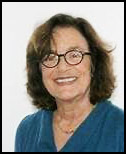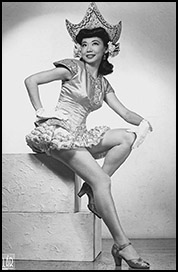Talking with Marnie Mueller (Ecuador) about her new book THE SHOWGIRL AND THE WRITER

Marnie Mueller (Ecuador 1963–65)
PCW: The Showgirl And The Writer is an unusual book about an unusual friendship. What initially drew you to your subject?
Marnie: For fifteen years I was friends with Mary Mon Toy, a Japanese American showgirl who had been incarcerated in an America concentration camp during World War II. Our bond was the fact that I, though Caucasian, was born in the Tule Lake Japanese American High Security Camp in northern California, where my parents, young leftists, had gone to work . . . much as I joined the Peace Corps decades later,
As Mary aged, I became her Power of Attorney and, when she died, the Executor of her estate, and it was only upon her death that I learned that during her entire theater career, after being released from camp, she had

Mary Mon Toy
passed as Chinese American. She had often regaled me with the story of her Chinese father, though she did confide in me that her mother was Japanese the reason for her imprisonment. When I discovered that she had been masking her Japanese heritage for over fifty years, I decided I had to know why, on both a personal and a political level.
And thus, my search and the makings of a book began. Simultaneously, I had questions to answer about myself, in particular the fact that during my formative years and on through college I had passed as Christian, hiding my Jewish heritage on my mother’s side behind my father’s last name. A parallel question for the book became how my own passing was related to my connection to the egregious act of incarcerating 120,000 people of Japanese descent in the name of protecting our democracy during wartime.
PCW: How long did it take you to write The Showgirl and the Writer?
Marnie: I began researching Mary’s life in 2010, shortly after her death. It took me close to 8 years to finish the book in this form, and then 5 years to find a publisher. Of course, I was continuing to edit and rewrite the book as I was sending it out.
PCW: Why did it take you eight years to write the book?
Marnie: This book was particularly difficult for me as I am primarily a fiction writer. The transition to a story line, based on an enormous amount of research, entailed trying to find a way to create a compelling narrative without simply making leaps and transitions out of my imaginative gifts.
As time went on, I found that I loved the deep research, what I call “the detective work.” Gradually I came to love the act of synthesizing the discoveries into a coherent, dramatic narrative.
One of the difficulties was that there was not just one strand of research to deal with, but three: my subject, Mary Mon Toy’s life and career; my family’s work in the Tule Lake camp; and third, the impact of that early experience on our family, myself, and my marriage to a German national who had grown up in Germany during the Second World War. Each strand entailed extensive research in a multitude of venues: the National Archives and Records Service (NARA):, the War Relocation Authority (WPA) personal case files on each incarcerated individual; the University of California’s Bancroft Library’s Japanese American Evacuation and Resettlement Records (JERS) written by and about staff and written by and about selected incarcerated Nisei intellectuals; contemporaneous newspaper clippings from various sources; face to face interviews with pertinent informants and friends of Ms. Mon Toy, Japanese American friends and colleagues of my parents, and my parents themselves; films, videos, books, oral histories pertaining to the Incarceration (including contemporaneous accounts as well as historical research of the era); high school and Juilliard School of the Performing Arts transcript records; immigration, citizenship, divorce, and obituary documents; on-line services, in particular the extensive Densho.org site for the history of the Incarceration of Japanese Americans during WWII; sites that recorded the bombing of my husband’s city of Augsburg, Germany; personal letters — often love letters to Mary Mon Toy; The Popular Balanchine Archive in New York City Performing Arts Library; and the Mayor Fiorello LaGuardia archive pertaining to the contentious relocation of Japanese Americans from the camps to New York City.
I also made visits to the sites of Tule Lake and the Minidoka concentration camp in Idaho where Mary Mon Toy was incarcerated. I visited the night club in Paris, France where she had performed, and flew to Oakland, California for an important and fortuitous interview with the tap-dancer Dorothy Toy, who had performed with Ms. Mon Toy in the China Doll Club in 1946. I had the lucky happenstance of interviewing the iconic performer and artist, Geoffrey Holder, in his nursing home, twenty blocks north of my apartment a few months before he died.
PCW: What next?
Marnie: Let me just say that I am a fast first draft writer, but a very slow rewriter. There was a lot of research to pack into one book. I had to find a way to organize the story into a fast-moving narrative, not bogged down with instructive, expository prose, but told in my own voice, carrying the reader through the trials, tribulations, joys, and successes of two women, one Japanese American, the other a Caucasian of Jewish descent, both artists in their own right who had been affected by one of America’s great crimes against democracy, the incarceration of a people, whose only crime was their ethnicity and race.
I hope when readers finish the book, they will have learned, for better or worse, more about America through the individual experiences of these two women, and been entertained along the way.
PCW: Thanks, Marnie
Thank you, Marnie and John. What a fascinating historical journey which began with the realization that a friend was Japanese and not Chinese.
Joanne, thank you for your support yet again!! I always keep you in mind when I get discouraged.
One day we have to actually meet in person.
Fondly, Marnie
Marnie, Your bookds have been incredibly important to me. “Green Fires” was the first I read, after almost thirty years of my Peace Corps experience, which finally helped me begin to understand what happened in my site, albeit a small rural community in southern Colombia. I am so grateful. Thank you so very much.
Marnie,
I am reading your book, and I’m in awe of the deep dive you’ve taken to understand your personal journey and it’s relationship to your worldview and search for meaning. Your research is extraordinary and your writing is beautiful! Congratulations! Geri Marr Burdman (RPCV Bolivia 1962-64)
Thank you, Geri! I take that as a high compliment coming from you. I look forward to seeing another one of your books on ageing well soon.
Fascinating subject, Marnie.
Sounds like a wonderful book.!
Best,
Richard Wiley
Richard, thanks. I look forward to your next book and the next and the next! You are amazingly prolific. Best, Marnie
Marnie, the interview is engrossing, particularly the challenges you faced and the research you undertook to write the book. Congratulations!
Steve, thanks, as always, for your generous comment, even as your travel and write the world!